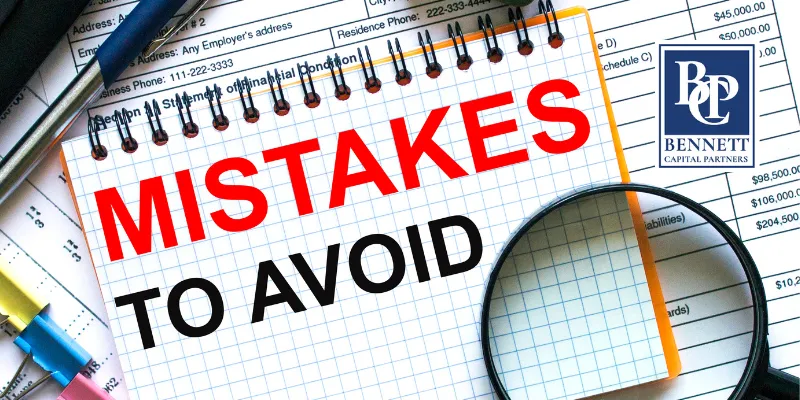Top 11 First Time Home Buyer Mistakes And How To Avoid Them
Updated: Jan 1

Avoiding first time home buyer mistakes is crucial in your journey to owning your first home. Bennett Capital Partners is here to guide you every step of the way. We understand that buying a home involves many decisions and potential pitfalls. That's why we've created this guide for you. In this article, we'll discuss common mistakes made by first time home buyers and offer strategies to avoid them.
Keep reading to start your journey towards owning your dream home. Remember, Bennett Capital Partners is always here to help. Let's get started!
Key Takeaways
✅ Early Mortgage Pre-Approval: Begin the mortgage pre-approval process early to understand your budget and demonstrate financial readiness to sellers.
✅ Compare Mortgage Rates: Don’t settle for the first mortgage rate quote; shop around with various lenders to ensure you get the best deal.
✅ Assess Your Finances: Before house hunting, thoroughly understand your financial situation, including debt-to-income ratio and credit score.
✅ Engage a Real Estate Agent: Partner with a knowledgeable real estate agent for expert guidance on local market trends and negotiation tactics.
Quick Navigation - Click the link below to jump to that section..
Common First Time Home Buyer Mistakes

First-time home buyers often make several common mistakes that can have negative consequences on their home buying experience.
⏩ 1. Not starting the approval process early
Diving headfirst into the hunt for your dream home without starting the mortgage approval process early with a mortgage broker is one of the most common mistakes by first-time home buyers. A mortgage broker will connect you with the best mortgage lender for your specific criteria and needs.
Selecting the correct mortgage broker upfront is critical as the mortgage approval process could take a significant amount of time. Before a mortgage loan can be approved the borrower must start with a mortgage pre-approval.
A mortgage pre-approval not only outlines your budget and how much you can afford but it also signals to the listing agent and sellers that you are financially capable. The institution giving the pre-approval also makes a huge difference to the sellers.
When they see a large bank or lender on the pre-approval letter they know the chances of closing are much less than that with a mortgage broker with a good reputation.
A pre-approval letter from Bennett Capital Partners gives you an edge in competitive real estate markets. Therefore, it's critical to engage with us and start this task as soon as possible.
📞 Give Us A Call Today 1-800-457-9057
⏩ 2. Looking at only one mortgage rate quote
One common mistake that many first-time home buyers fall into is accepting the first mortgage rate quote they encounter. While it might seem easier to just go with the initial offer, this approach can cost you in the long run.
Mortgage rates vary between different lenders and can make a large difference to monthly payments over the life of your loan.
For instance, even a small variation like 0.5% could equate to thousands of dollars throughout your repayment period. Therefore, ensure to conduct thorough comparison shopping among various mortgage lenders before making your decision.
This process involves comparing interest rates from multiple sources of mortgage loans such as banks, credit unions or online lenders to secure more favorable loan terms and get the best deal for your needs.
Comparing interest rates to securing favorable loan terms, can be a daunting task. This is where Bennett Capital Partners steps in. As a leading mortgage brokerage, we specialize in guiding you through this intricate process.
Our expertise and extensive network of banks, credit unions, and online lenders ensure you get the best deal tailored to your needs.
With Bennett Capital Partners, you're not just hiring a broker; you're gaining a partner committed to making your first home purchase as seamless and advantageous as possible.
⏩ 3. Not understanding your finances
Many first-time home buyers plunge into the home buying journey without fully understanding their financial situation. This is a common pitfall and can lead to numerous complications, like acquiring a higher monthly mortgage or larger down payment amount than you can comfortably afford or failing to account for additional homeownership costs such as property taxes, insurance, and maintenance fees.
To sidestep these issues, be sure to take a comprehensive look at your finances before house hunting. Calculate your debt-to-income ratio - it's vital since lending institutions use this when determining your mortgage loan for approval - and keep tabs on your credit report regularly to ensure there are no errors that may negatively affect your mortgage approval process.
⏩ 4. Not working with a real estate agent
One crucial mistake that many first-time home buyers make is not working with a real estate agent. A trusted and experienced agent can provide valuable guidance throughout the entire home buying process, helping to ease anxiety and ensuring you make informed decisions.
They have extensive knowledge of the local market, access to listings that may not be available to the public, and expertise in negotiation tactics. An agent will represent your best interests and help you find a home that fits your needs and budget.
They can also connect you with other professionals such as real estate attorneys, home inspectors, and insurance agents who are essential in completing a successful home purchase. By working with an agent, you'll have a knowledgeable ally by your side who will navigate any challenges that arise, saving you time, money, and stress.
⏩ 5. Not getting a home inspection
One of the most crucial steps that first-time home buyers often overlook is getting a home inspection. Not only does this help to identify any potential issues with the property's structure or core systems, but it also helps to avoid future financial difficulties.
Waiving a home inspection is considered risky and could lead to costly surprises down the road. By having a professional inspect the property, you can gain peace of mind knowing that you are making an informed decision about your investment.
A thorough home inspection will reveal any hidden problems and give you the opportunity to negotiate repairs or reconsider your purchase if necessary. Remember, investing in a quality home inspection is an essential step towards becoming a confident and responsible homeowner.
⏩ 6. Not negotiating the price.
One common mistake that first-time home buyers often make is not negotiating the price of their potential new home. Many assume that the listing price is fixed and non-negotiable, but this isn't always the case.
By not negotiating, you could end up paying more than necessary for your home.
It's important to remember that sellers often list their homes at a higher price with room for negotiation. Don't be afraid to make an offer below the asking price and see if there is any flexibility.
Negotiating can potentially save you thousands of dollars.
To negotiate effectively, do your research on comparable sales in the area and gather as much information as possible about the property's condition and market demand. Use these facts to support your offer and present it confidently to the seller or their agent.
Keep in mind that negotiations are a give-and-take process, so be willing to compromise when appropriate.
⏩ 7. Buying more home than you can afford
One of the biggest mistakes first-time home buyers make is buying more home than they can afford. It's easy to get caught up in the excitement of owning a beautiful house, but it's important to remember that homeownership comes with financial responsibilities.
Overextending yourself by purchasing a property beyond your means can lead to long-term financial difficulties and stress. Instead, focus on determining a realistic budget based on your income, expenses, and savings.
Consider factors like monthly mortgage payments, property taxes, homeowner's insurance, and maintenance costs when calculating how much house you can truly afford. By staying within your means, you'll be able to enjoy homeownership without unnecessary financial strain down the road.
⏩ 8. Not being prepared for unexpected expenses
Being a first-time homebuyer can be an exciting and overwhelming experience. However, one common mistake that many first-timers make is not being prepared for unexpected expenses. It's essential to factor in the costs beyond just the down payment and monthly mortgage payments.
Owning a home comes with additional expenses like home maintenance, repairs, utility bills, and property taxes. Not setting aside funds for these unexpected costs can put a strain on your finances and leave you scrambling to cover them when they arise.
To avoid this pitfall, it's crucial to create an emergency fund specifically earmarked for homeownership expenses. By setting aside money each month, you'll be better prepared for any unforeseen financial burdens that may come your way.
⏩ 9. Not being patient
Patience is key when it comes to the home buying process. Rushing into a purchase can lead to costly mistakes and regrets down the line. Taking the time to thoroughly research and assess your options ensures that you make an informed decision about buying a house that aligns with your financial goals.
Remember, finding your dream home takes time, so be patient throughout the process. It's better to wait for the right opportunity than rush into something that may not be the best fit for you.
By being patient, you can avoid making hasty decisions and ultimately find a home that meets both your needs and budget.
⏩ 10. Not checking your credit report
Checking your credit report is a crucial step in the home buying process that many first-time buyers overlook. Your credit score plays a significant role in determining your mortgage eligibility and interest rates.
By not checking your credit report, you may miss errors or discrepancies that could negatively impact your borrowing power. Additionally, reviewing your credit report regularly allows you to identify areas for improvement and take steps to boost your score before applying for a mortgage.
This can help you secure more favorable loan terms and save you thousands of dollars over the life of your loan. Don't underestimate the importance of keeping an eye on your credit report – it's one of the best ways to position yourself for success when purchasing a home.
⏩ 11. Not getting educated about the home buying process
One of the biggest mistakes that first-time home buyers can make is not taking the time to educate themselves about the home buying process. It's important to understand every step involved in purchasing a home, from getting pre-approved for a mortgage to closing on your new property.
By educating yourself, you'll have a better understanding of what to expect and be able to navigate through the process with confidence.
By learning about different loan programs available, like FHA loans or USDA loans for moderate-income homebuyers, you may discover more affordable options that suit your needs. You'll also gain insights into how much house you can afford based on factors such as debt-to-income ratio and credit score.
Additionally, knowing which documents will be required by mortgage lenders, such as bank statements or proof of employment, will help speed up the approval process.
How to Avoid First-Time Home Buyer Mistakes

To avoid first-time home buyer mistakes, it is crucial to start the approval process early and determine your budget beforehand. Shop around for mortgage rate quotes, work with a trusted real estate agent, and regularly check your credit report to ensure favorable loan terms.
Start the pre-approval process early
As a first-time homebuyer, one of the most important steps you can take is starting the approval process early. By doing so, you'll gain a better understanding of how much house you can afford and appear more serious to sellers.
Getting pre-approved for a mortgage allows you to determine your budget and shows sellers that you're financially ready to make an offer. It also gives you time to address any potential issues with your credit report or finances before starting your home search.
So don't wait until the last minute – start the approval process early and set yourself up for success in finding the perfect home within your budget.
📞 Give Us A Call Today For Same Day Pre-Approvals 1-800-457-9057
Shop around for mortgage rate quotes to get the lowest monthly mortgage payment
At Bennett Capital Partners, we understand the significance of securing the best mortgage rates for your home loan. As experienced mortgage brokers, we take on the essential task of shopping around for mortgage rate quotes on your behalf. This approach is vital for several reasons:
Work with a trusted real estate agent

A trusted real estate agent can be your guiding light throughout the home buying process. They have the knowledge and experience to help you navigate through all the complexities, from finding the right neighborhood to negotiating a fair price.
With their expertise, you can avoid common pitfalls and make informed decisions. Real estate agents have access to a wide range of resources and can provide valuable insights into market trends, property values, and comparable sales in your area of interest.
By working with a trusted agent, you'll gain peace of mind knowing that someone is advocating for your best interests every step of the way. Trust me; having a professional in your corner will greatly enhance your first-time home buying journey.
Determine your budget and stick to it
As a first-time homebuyer, one of the most important steps you can take is to determine your budget and stick to it. This means carefully evaluating your financial situation and understanding exactly how much house you can afford.
By setting a realistic budget and minimum down payment, you can avoid overspending and potential financial difficulties down the line. Take into account factors such as your monthly income, existing debts, and future expenses to calculate an affordable mortgage payment.
Remember that buying a home involves more than just the purchase price - there are closing costs, homeowners insurance, property taxes, maintenance costs, utility bills, moving expenses, mortgage insurance and potential HOA fees to consider as well.
Check your credit report regularly

Regularly checking your credit report is a crucial step in the home buying process. By doing so, you can ensure that there are no errors or discrepancies that could negatively impact your loan rates.
It's important to remember that even small mistakes on your credit report can lead to higher interest rates, which can significantly affect your monthly mortgage payments.
By staying vigilant and regularly reviewing your credit report, you can correct any inaccuracies and put yourself in a better position to secure more favorable loan terms.
So don't forget to check your credit report throughout the home buying journey!
Additional Tips for First-Time Home Buyers

Consider exploring first-time home buyer programs in your area, as they can provide valuable resources and financial support.
Consider first-time home buyer programs
There are numerous first-time home buyer assistance programs available that can make homeownership more affordable and accessible. These programs often offer grants or loans with competitive mortgage rates, allowing you to purchase your dream home with less money upfront.
For example, government-backed loans like FHA, VA, and USDA loans provide options specifically tailored for first-time buyers. These programs can help reduce the amount of money needed for a down payment and offer more favorable loan terms.
Additionally, many states and local governments also have their own unique assistance programs designed to support moderate-income home buyers. Exploring these possibilities can be a game-changer when it comes to buying your first home.
Explore government-backed loan options
When it comes to buying your first home, exploring government-backed loan options is a smart move. These loans, such as FHA loans, VA loans, and USDA loans, offer more affordable options for first-time homebuyers.
For example, FHA loans are popular among those with lower credit scores or smaller down payment amounts. VA loans cater specifically to military veterans and their families by offering flexible eligibility criteria and competitive interest rates.
USDA loans support moderate-income homebuyers in rural areas who may not qualify for traditional financing from private lenders. By exploring these government-backed loan options, you can find more favorable loan terms that make homeownership within reach.
Research the neighborhood before purchasing

Before purchasing your first home, it is essential to thoroughly research the neighborhood you are considering. This step is crucial to ensure that the surrounding area aligns with your needs and preferences.
Find out about the amenities in the area, such as schools, parks, shopping centers, and healthcare facilities. Take note of crime rates and safety concerns by checking local crime statistics and talking to neighbors or visiting at different times of day.
Additionally, consider future development plans for the neighborhood to ensure there won't be any unwanted surprises down the road. By conducting thorough research on the neighborhood before making a purchase, you can make an informed decision that will contribute to a happy and satisfying homeownership experience.
Don't make emotional decisions
One of the biggest mistakes first-time home buyers can make is letting their emotions drive their purchasing decisions. It's easy to fall in love with a beautiful house that checks all the boxes on your wish list, but it's important to stay level-headed and think about the long-term financial implications.
Making an emotional decision can lead to overspending or compromising on key factors like location, budget, or future resale value. Remember, buying a home is an investment, so it's crucial to approach it with a clear mind and objective criteria.
Take the time to carefully evaluate each property based on its practicality and suitability for your needs.
Get a home inspection
Getting a home inspection is a crucial step that first-time home buyers shouldn't skip. It helps identify potential issues with the home's structure or core systems, giving you a clear understanding of its condition before making one of the biggest financial decisions of your life.
By having a professional inspect the property, you can avoid costly surprises down the road and negotiate repairs or price adjustments if necessary. Remember, waiving this important step could lead to major headaches and expenses in the future, so it's always wise to be thorough when buying your first home.
Conclusion

If you're a first time home buyer, it's essential to avoid common mistakes that can cause stress and delays. The key is to start the approval process early. Work with an experienced mortgage broker like Bennett Capital Partners, and work with a trusted real estate agent. Also, make sure to stay within your budget.
Make sure to check your credit report and get a home inspection. This will ensure that your purchase goes smoothly.. With careful planning and education, you'll be able to find your dream home without any unnecessary setbacks or surprises.
FAQs

What are the common mistakes first-time home buyers make?
Common mistakes made by first-time home buyers include not getting pre-approved for a mortgage, underestimating the costs of homeownership, neglecting to budget for additional expenses like maintenance and repairs, and rushing into a purchase without doing thorough research.
How can I avoid making mistakes when buying my first home?
To avoid making mistakes when buying your first home, it is important to take the time to educate yourself about the homebuying process, work with an experienced real estate agent who can guide you through the process, get pre-approved for a mortgage before house hunting, budget carefully for all costs associated with homeownership, and thoroughly inspect any property you are considering purchasing.
Is it necessary to hire a real estate agent as a first-time home buyer?
While it is not legally required to hire a real estate agent as a first-time home buyer, working with an experienced agent can provide valuable expertise and guidance throughout the process. They can help you navigate complex paperwork, negotiate on your behalf, and ensure that you find the best possible deal.
How much money should I save before buying my first home?
The amount of money you should save before buying your first home depends on several factors including the price range of homes in your desired area and your personal financial situation. In general, it is advisable to have enough savings to cover at least 20% of the home's purchase price, as a down payment along with additional funds for closing costs and potential unexpected expenses. However, there are various loan programs available that allow for lower down payments if needed.

Philip Bennett
Philip is the owner and Licensed Mortgage Broker at Bennett Capital Partners, Bus. NMLS # 2046828. He earned his degree in Accounting and Finance from Binghamton University and holds a Master's Degree in Finance from NOVA Southeastern University. With more than 20 years of experience, Philip has been a leader in the mortgage industry. He has personally originated over $2 billion in residential and commercial mortgages.
Learn more about Philip Bennett's background and experience on our Founder's page. Whether you're a first-time homebuyer or a seasoned real estate investor, our team is here to help you achieve your real estate goals. Don't wait any longer, contact us today and let us help you find the right mortgage for your needs.
Discover helpful tips and tricks on mortgages by reading our blog posts
Find Out How You Can Own Your Dream Home With The Florida Hometown Heroes Housing Program! to learn how essential workers can gain access to an array of benefits, including zero-interest loans, down payment assistance, and closing cost relief. Click here to read the full article
Condo Financing Problems: Seven Issues to Be Aware Of To learn more about common condo financing problems to be aware of. Click here to read the full article
First-time Homebuyer's Guide To Getting A Mortgage To learn more about first time homebuyer programs. Click here to read the full article
